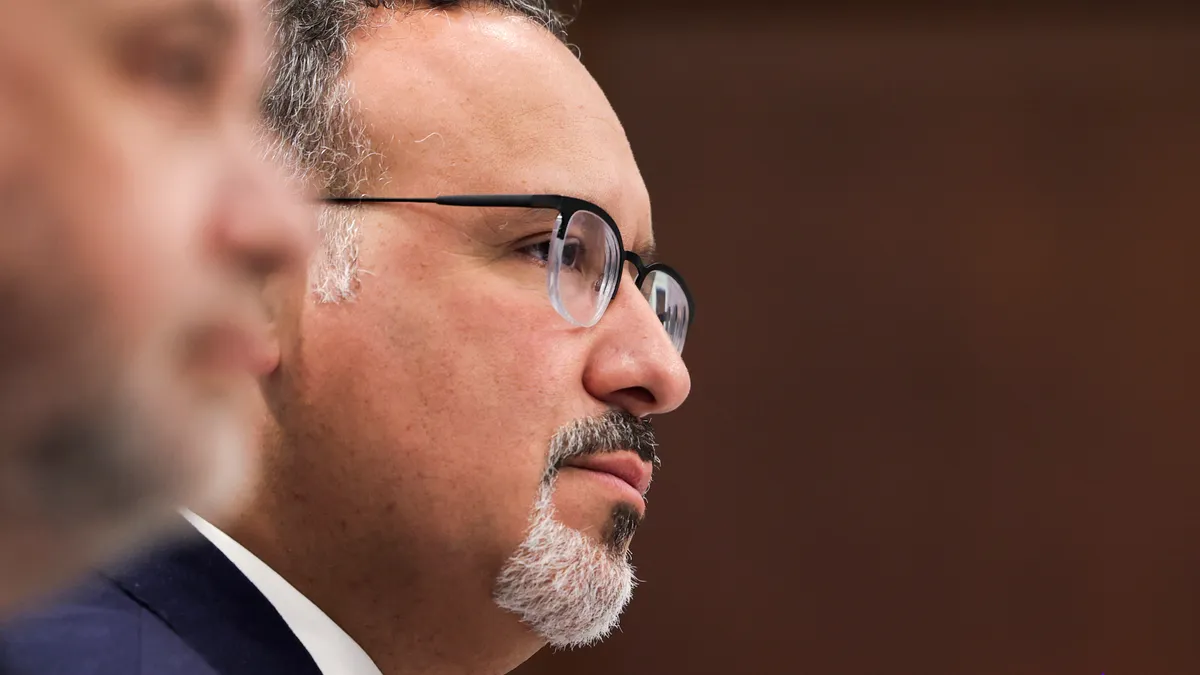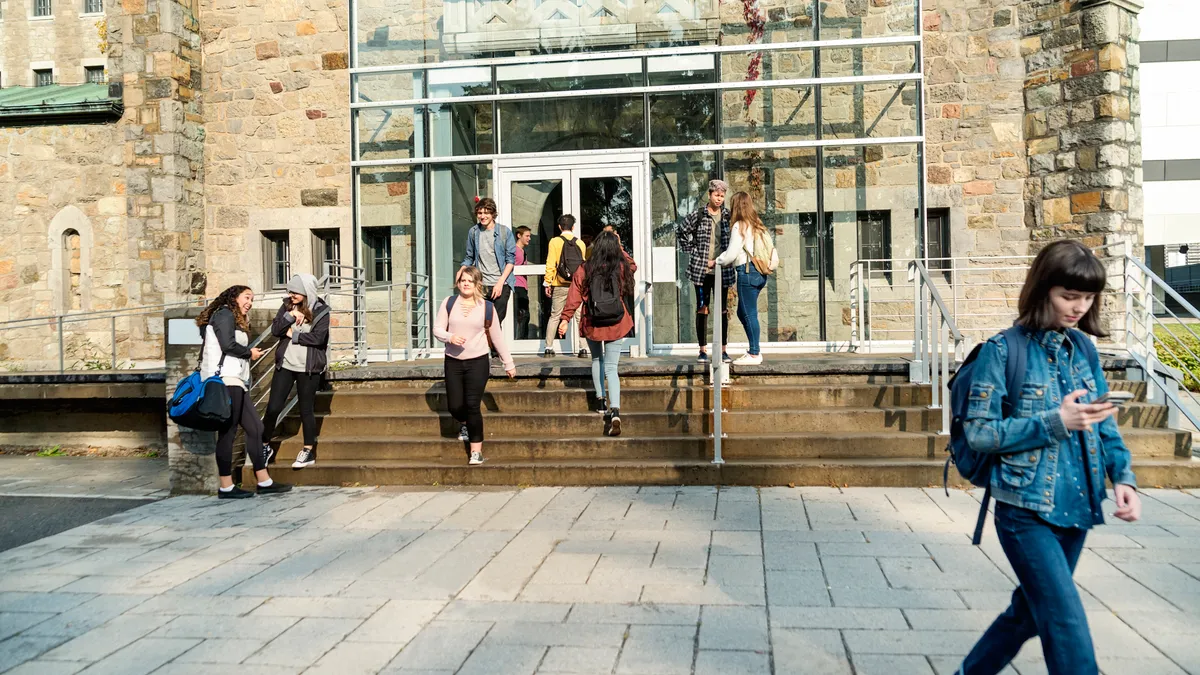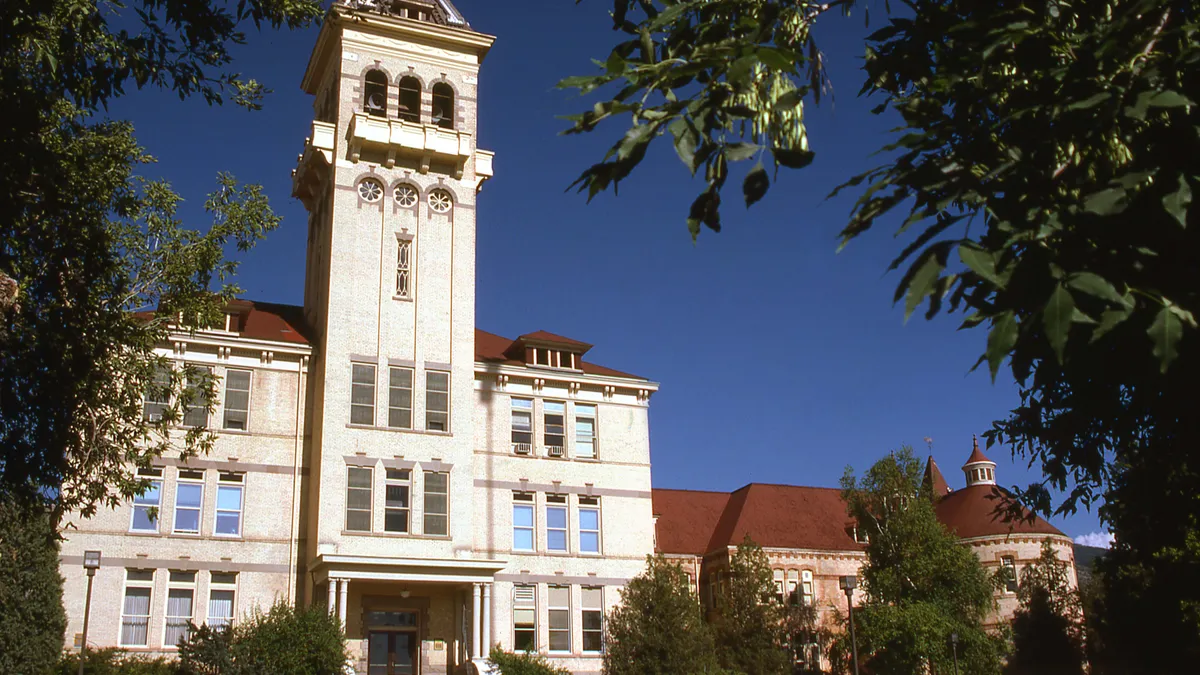Colleges face a grim and uncertain financial future as the coronavirus spreads throughout the U.S. and upends the global economy.
In the past several weeks, colleges nationwide have been preoccupied shifting classes and exams online, which for many meant spending time and money to create a robust enough digital infrastructure to support an influx of students.
As students and instructors adjust to remote learning for the immediate future, administrators are turning to a new challenge: shielding their institutions' finances while addressing students' demand for refunds of room, board and other fees.
After colleges ordered students to vacate campus residence halls in light of the virus, some promised to repay a portion of their room and board expenses. Doing so, however, would likely stress their budgets, as schools typically lack contingency plans for returning those funds.
With historically anemic state funding at public colleges and skyrocketing discount rates at private ones, institutions have come to rely on those fees much more.
Auxiliary revenues make up, on the median, about 9% of gross revenues for the roughly 150 public universities S&P Global rates, according to Jessica Wood, a senior director and education sector leader for the firm.
For the 250 or so private colleges S&P tracks, they account for a median of 11% of revenue, though Wood noted the rate can vary widely at those schools — for example, auxiliary fees account for only about 4% of Harvard University's revenue.
Still, observers say, refunding auxiliary fees could significantly cripple institutions across the sector.
"It's like if you have a three-legged stool and just cut off one leg," Barbara Mistick, president of the National Association of Independent Colleges and Universities (NAICU), told Education Dive.
Approaches to refunds
Some colleges are refunding some or all of students' room and board costs directly, while others have weighed offering a credit toward those fees in future semesters. Several have said they are still looking into whether they will offer a refund at all. Institutions have not agreed to reimburse tuition, as most have kept instruction going online.
Offering a credit would allow colleges more time to figure out a way to compensate for lost revenue, said Jim Hundrieser, vice president for consulting at the National Association of College and University Business Officers, in an interview with Education Dive. The virus came at an inconvenient time for colleges because they won't take in a significant amount of tuition revenue until the fall, he said.
Whether credits will appease students and their families on a national scale remains unknown, but some have already objected. Arizona's board of regents was sued to force it to pay back room, board and other fees at Arizona's three public universities. The University of Arizona was offering prorated credits for housing and meals, but the lawsuit claims they don't cover the full amount students lost. The other two public colleges, Arizona State University and Northern Arizona University, haven't yet offered refunds.
Public pressure to issue refunds has put colleges in a difficult position, especially if they're unable to afford them. Widespread petitions have called on various institutions to give students their room and board money back. As Carlo Salerno, the vice president for research at financial aid consultancy CampusLogic, noted on Twitter, institutions that lose lawsuits like the one targeting Arizona could be left "financially demolished." Win the case, he wrote, and students could be loath to pursue campus housing.
"It's like if you have a three-legged stool and just cut off one leg."

Barbara Mistick
President, National Association of Independent Colleges and Universities
Other institutions have decided to eat the costs.
The University of California, San Diego will return students' full housing fees for the spring quarter. Ohio State University, the Nebraska State College System and the University of North Carolina System all said they would refund part of students' room and board.
The extent to which refunds would burden institutions will ultimately depend on their wealth, how long the pandemic lasts and whether it hamstrings enrollment beyond the fall semester.
Colleges that won't be giving refunds may not be financially positioned to do so. Take Georgetown College, a small Christian institution in Kentucky. In November, Forbes graded its financial health a D based on nine factors, such as how much it relies on tuition and its liquidity. Georgetown indicated on its website that it would likely not be able to provide refunds because "the college's costs are not adjusting even though students are not here."
Most of colleges' typical expenses haven't diminished because campuses have partially shut down. And in addition to having to invest new funds in online education, some institutions expect an enrollment slump among lucrative, full-tuition-paying international students.
The sector also stands to lose hundreds of millions of dollars in distributions from the National Collegiate Athletic Association, which announced last week it would reduce the amount of money it planned to pass on to schools after canceling winter and spring championships.
Institutions have already felt financial pains from the pandemic, with some cutting staff pay and others laying off staff members. Even Cornell University, with an endowment of more than $7 billion, announced it would freeze hiring and salaries, and stop discretionary spending, such as hiring outside consultants.
Though it hasn't linked the decision to the coronavirus, Notre Dame de Namur University, a Catholic institution in California, said in a notice last week that it would not enroll new students in the summer or fall and could not guarantee it would remain open. Also, MacMurray College, in Illinois, recently announced plans to close.
Moody's Investors Service reported this month that 5% to 10% of institutions it monitors already have particularly low liquidity and shaky operational funding and therefore will have trouble weathering the crisis.
"In an uncertain marketplace, maintaining your liquidity is crucial," NAICU's Mistick said. "Refunds and everything else can have an impact on your cash reserves."
Auxiliary fees and the budget
Colleges that offer refunds expect to take a financial hit.
The University of Maine System, which closed its residence halls for the remainder of the semester, estimates it will suffer a $20 million loss in short-term revenue because of the coronavirus. Of that, nearly $13 million will come from returning room and board fees, Dannel Malloy, the system chancellor, wrote in a letter to the state's congressional delegation last week.
"Never in the history of the University of Maine System have we seen a challenge such as the one that confronts us now," Malloy wrote.
Administrators could cover the cost of issuing refunds in myriad ways, said Brian Mitchell, co-author of "How To Run a College," a prominent book about higher ed management, and the former president of Bucknell University, in an interview with Education Dive.
They could draw from reserve funds, or the unrestricted portion of their endowment with a governing board's permission. However, Mistick said, institutions would be disinclined to try the latter option as the current volatility in the stock market has hurt endowments. Colleges also could use federal funding they receive from the stimulus package Congress passed last week, but it is unclear exactly how much they will get.
While room and board are auxiliary enterprises, the fees they generate typically support the academic side, Mitchell said, adding that refunding them "cuts to the core of academic programming."


















